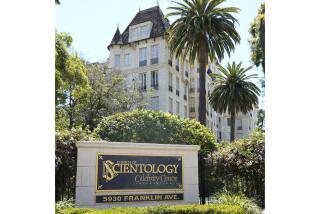French Scientology group convicted of fraud, fined
- Share via
PARIS — A French court on Tuesday convicted the Church of Scientology here of fraud, fining the branch $888,000 for swindling former members, but stopped short of shutting down the group.
French Scientology leader Alain Rosenberg was also convicted of fraud and received a two-year suspended prison sentence and a fine of $44,000.
With its judgment, the court warned, “Be careful . . . next time, justice won’t let you go if you continue using the same methods,” said Olivier Morice, a lawyer for civil parties in the case.
The case was brought to court after complaints by former Scientologists who said they were manipulated into paying the group between $30,000 and $73,000 in exchange for ritual products.
“They asked for the death sentence . . . and the court decided today that the Church of Scientology should continue living,” said defense lawyer Patrick Maisonneuve to journalists.
Scientology officials, who say the group deserves the same rights as any religion here, declared that they would appeal the court’s action.
In June, state prosecutor Maud Morel-Coujard had demanded that the church be dissolved and its bookstore shut down. But because of a change in the law after the case had begun, the government could not disband such a group for a conviction of fraud. The law has since been changed again but could not apply to the Scientology case since it was underway.
The trial was the sixth against Scientology officials but the first targeting the entity as a whole in France.
In Tuesday’s court action, the Church of Scientology Celebrity Center and SEL bookstore here were convicted of tricking several followers into paying thousands of euros in exchange for participation in the group’s various rituals during the 1990s.
Georges Fenech, head of Miviludes, a government cult-fighting unit, said Tuesday that the court’s decision “condemned [the French branch of Scientology] as an entity . . . due to its fraudulent way of operating.”
If “they begin swindling again, they can be subject to dissolution in the future,” he said.
The ruling against the whole organization “is a historical turning point for the fight against cult abuses,” said Fenech, who investigates communal living groups and other associations suspected of cult-like manipulation of their members.
Though church members are “allowed to continue their activity . . . a seed has been planted,” he added.
Scientologists in France questioned whether minority religious groups are freely accepted.
“There is an attitude toward religious minorities in general . . . that is pretty catastrophic,” said Eric Roux, the Celebrity Center spokesman and a Scientology minister.
Since the state backs certain “anti-sect” watchdog groups such as Miviludes, “we have a government that pushes for hate against religious minorities,” Roux said.
French law forbids any official ruling on the religious nature of the Church of Scientology, leaving the public to draw its own conclusions.
Fenech insists that he and others are not critical of the beliefs of Scientologists. If the group’s founder “thinks there was an intergalactic war 75,000 years ago . . . that’s his problem and the problem of Scientologists,” he said.
“What we contest is the fraud that is committed against families and individuals,” he said.
He listed the “exorbitant” price of Scientology’s purifying and vitamin-infused spiritual exercises, personality tests and other rituals.
These costly practices can lead one to “no longer act of his own free will, but become completely dependent on this organization that will exploit his weakness to the maximum, in order to attain a fortune,” Fenech said.
A U.S. spokesman for the Church of Scientology International assailed the French verdict, saying the proceedings amounted to a “heresy trial.”
The spokesman, Tommy Davis, who said the church would appeal, added that Scientologists have won similar cases elsewhere in Europe that challenged the church’s legitimacy.
“France is pretty much in the Dark Ages on the subject of religious tolerance,” Davis said. “We’ll prevail as we have repeatedly in situations approximating this one.”
Scientology has faced legal battles in the United States and Europe since it was founded more than 50 years ago by science fiction writer L. Ron Hubbard. It also has attracted many high-profile celebrities.
The church was granted tax-exempt status in the U.S. in 1993 after a long battle with the IRS, which had maintained that Scientology was a business, not a religion. It has long struggled to gain acceptance as a religion in European countries, including Germany, where officials have publicly criticized the group.
--
Lauter is a special correspondent.
Times staff writer Duke Helfand in Los Angeles contributed to this report.
More to Read
Sign up for Essential California
The most important California stories and recommendations in your inbox every morning.
You may occasionally receive promotional content from the Los Angeles Times.










